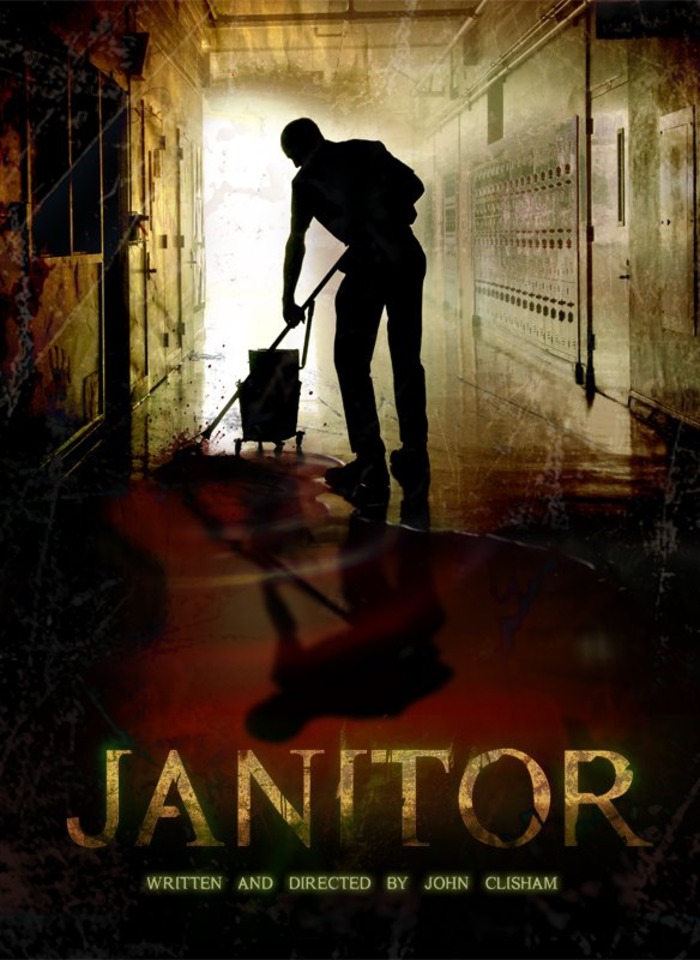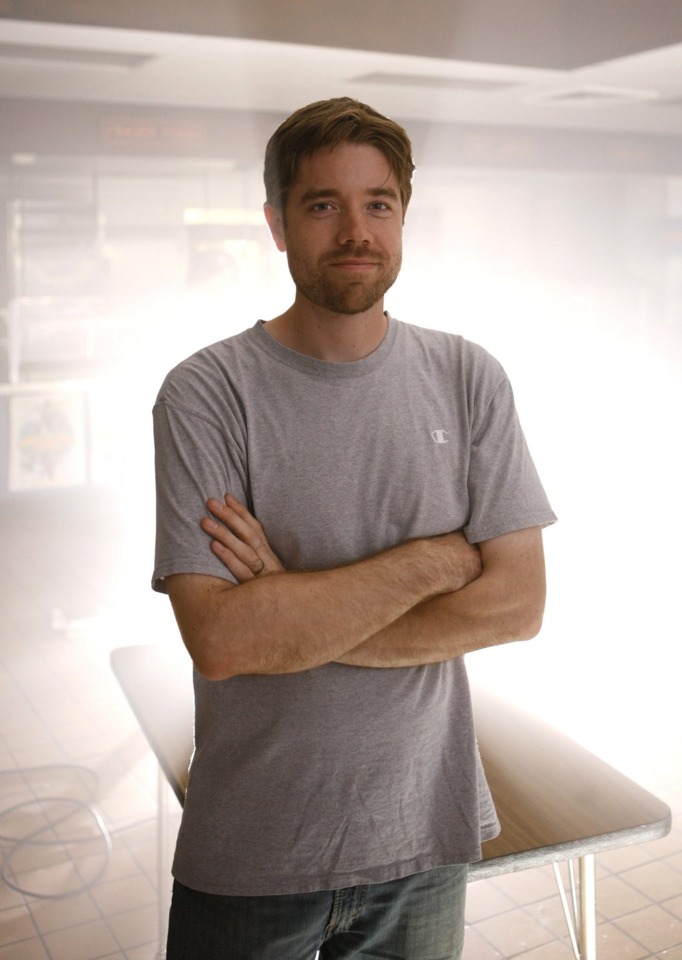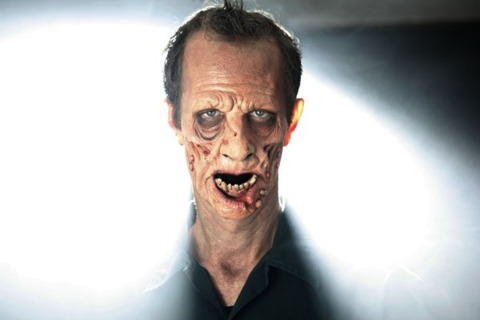Q&A: Horror filmmaker spooks Xbox Live
While working on James Cameron's forthcoming sci-fi epic Avatar, John Clisham directed the first narrative short film distributed exclusively via Microsoft's online marketplace.
In November 2006, one year after the Xbox 360 debuted, Microsoft launched the video store for Xbox Live Marketplace. Since then, the service has been a hit, delivering tens of millions of pieces of video content to millions of subscribers. More than 35 television channels and film studios offer a range of shows for sale and films for rent on the service. There's also a lot of video content covering the game industry produced by Microsoft and external partners, including GameSpot.
However, it wasn't until this month that the first original narrative short film made for XBLM debuted just in time for Halloween. Titled Janitor, the 9.5-minute horror-thriller is a throwback to the gore-spattered slasher films of the 1980s. It profiles a young student who finds her very soul in peril after the custodial engineer at her school undergoes a "paranormal transformation." It stars Jenna Dewan, who was the lead in the dance film Step Up and a supporting player in the horror movie The Grudge 2.
Janitor is the first of six confirmed Xbox Live original shorts. The other five will go live the week of November 19 to help show off the HD video capabilities of the New Xbox Experience. Though most of the shorts are darkly comic, their directors include some big names in horror, including James Wan and Leigh Whannell (Saw), Andrew Douglas (the Amityville Horror remake), James Gunn (Slither), and David Slade (Hard Candy and 30 Days of Night).
Janitor, however, was directed by a relative unknown, John Clisham. Like James Silva, the amateur developer whose DIY XNA project Dishwasher was the toast of Microsoft's 2008 Game Developers Conference presentation, Clisham worked in relative obscurity until he caught the game giant's eye.
"I started off at a small production company in Santa Monica, which has done a lot of business with [Microsoft]," the filmmaker told GameSpot. "They saw me working late at night and on weekends making these little horror movies and asked to pitch to them, which I did."
Besides being attracted by the opportunity to have his film seen by 14 million Xbox Live subscribers, Clisham was drawn to the online service's technical flourishes. "The infrastructure they have is really great," he explained. "Even though it's a lot of data, it starts playing in HD pretty quickly. I used to put my movies on Web sites in Flash, but it never really looked cinematic. The best thing about XBL is it goes right to people's houses through the Web, but it's still going to look really good."
According to Clisham, Microsoft's motivation for making the original content was to toy with the idea of turning Xbox Live into a "television network of sorts." Indeed, the software colossus refers to Janitor and other shorts as "pilots" and intends to expand them into outright series if they prove popular enough. "They're testing the waters," explained Clisham, who is confident of success. "They told us that if even a few thousand people watch this, we will be back for round two."
The XBL original shorts are also like television shows insofar as they are free to watch--or in this case, download--and create revenue via ads. The US Air Force is running a spot with Janitor, with advertisers for the other shorts to be named later. To placate advertisers, the default versions of the shorts will be cut to a PG-13 level of violence and gore, with an R-rated cut also being available.
However, just because the US Defense Department is paying to advertise with the Xbox Live shorts doesn't mean they're big budget. "Microsoft didn't want to spend a lot of money," said Clisham, "and they told us that up front. 'That way,' they said, 'If nobody likes these things, we didn't lose a lot of money.'"
The result was ironic: A guerrilla digital video shoot for a corporation with tens of billions of dollars in cash reserves in the bank. "I think the total budget was about $15,000, with a crew of about 40 people," said the filmmaker. Obviously, like many shoestring productions, Janitor relied on many volunteers on its set. "The film I'm working on now is sort of big budget," he explained. "So there are just a lot of people around willing to help. It's a family atmosphere, since we've all been on this shoot for so freaking long."

"Sort of low budget" is sort of an understatement. Currently, Clisham is working on Avatar, the first film helmed by Terminator director James Cameron since 1997's Titanic. Due out next year, the science-fiction epic reportedly has a budget north of $200 million and will also be shot in 3D. It also has an upcoming game adaptation from Ubisoft, which was, at one point, purported to be a massively multiplayer project.
Speaking from the soundstage where the film is being shot, Clisham said that the Avatar film crew is working in close conjunction with developers of Ubisoft's game, which is reportedly already running on the Xbox 360 and will, like the film, require 3D glasses to view.
"We know there have been meetings," said Clisham, "From what I've heard on the set, the integration [of the game and the film] is getting a lot tighter" than previous projects. He thinks that this is indicative of a greater trend in the film and game industries, since the two are increasingly using the same tools and software, such as Autodesk's Maya.
"At one point, I think they'll be one in the same," he predicted. "You have all your visual effects shots and [game] art assets taken from the same elements. ... I think it'll help with the consistency of the look at feel."
Indeed, Clisham believes that soon games and film will be held in the same artistic regard as films by the public at large. "It's just a few years away," he said. "I mean just look at the Resident Evil series--just look at its visual style. I think in 20 years people look will back and reference those and quote those just like films."
But just because he is a filmmaker who enjoys the Resident Evil games doesn't mean he likes the Resident Evil films. "I think I just tuned out after the second one--all they have in common with the game is a title," he rued. "Overall, the state of game-based films is pretty weak. I can't think of any movie based on a game that's totally awesome."
Why the dearth of classic game-based films? "I don't know if they're not gamers, but I think the filmmakers don't respect the property in the same way that the [game] creator does," explained Clisham. "It's like when a book is turned into a film. If the director really understands the story or he has a hand in adapting the screenplay, it makes a so much better product. However, I think if you had someone who was involved in a key part of the game, either as a designer or a writer, as a key part of the movie, that would definitely help."
The indefinite postponement of the Peter Jackson-produced Halo film hit Clisham especially hard, since he was an admirer of director Neil Blomkamp's live-action Halo shorts. "It could have been another Star Wars--I can't believe they messed that up," he complained. He does, however, have hope in one project. "I think they did the right thing by getting Cliff [Bleszinski] involved in the Gears of War film," declared Clisham. "I think that's a great example of how it should be done."
Got a news tip or want to contact us directly? Email news@gamespot.com


Join the conversation